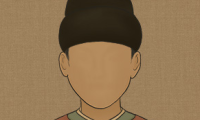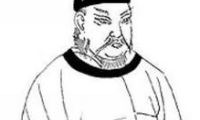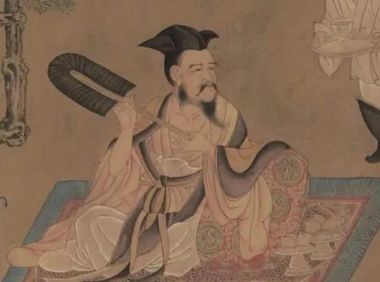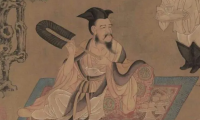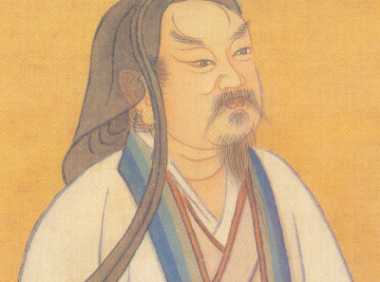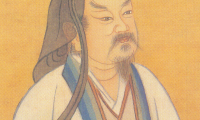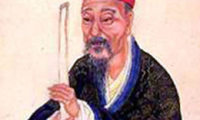-
Broken Jade: Separation
劈破玉 民间曲调 要分离,除非天做了地; 要分离,除非东做了西; 要分离,除非官做了吏。 你要分时分不得我, 我要离时离不得你; 就死在黄泉也, 做不得分离鬼! Broken Jade: Separation folk tune To separate, let heaven fall into earth; To separate, let east turn into west; To separate, let greybeard become greenhorn. You’d rather separate, but I would not; I’d rather separate, but you would not. Even if we die, in netherworld, We are not to be separated. (王宏印 译)...
- 0
- 0
- 64
-
Mao Xuan: A Little Damsel
摘要: 双语诗歌《幼女词》 幼女词 毛铉 下床着新衣,初学小姑拜。 低头羞见人,双手结裙带。 A Little Damsel Mao Xuan Getting off her bed and putting on a new dress, She bows to Heaven and Earth like a young bride. Not a little embarrassed, she hangs her head, Her hands coiling the girdle of her skirt. (王晋熙、文殊 译)...
- 0
- 0
- 51
-
Yue Wei Cao Tang Notes
高冠瀛言,有人宅后空屋住一狐,不见其形,而能对面与人语。其家小康,或以为狐所助也。有信其说者,因此人以求交于狐,狐亦与款洽。一日,欲设筵飨狐,狐言老而饕餮,乃多设酒肴以待。比至日暮,有数狐醉倒现形,始知其呼朋引类来也,如是数四,疲于供给,衣物典质一空,乃微露求助意。狐大笑曰:“吾惟无钱供酒食,故数就君也,使我多财,我当自醉自饱,何所取而与君友乎?”从此遂绝。此狐可谓无赖矣,然余谓非狐之过也。 Gao Guanying told me that a fox-spirit lived in an empty room behind someone’s house, keeping out of sight but able to talk with people. That household was well-off, and word spread that the fox had something to do with this. A man who believed this persuaded the owner of the house to introduce him to the fox-spirit, who agreed to chat with hi. One day this man invited the fox to a feast. As the fox said he was old and gluttonous, he prepared plenty of food and drink to entertain him. That evening, when several foxes got drunk and revealed their forms, he realized that the fox had brought some of his friends. After giving such feasts several times, the man had run out of money and was forced to pawn all his clothes and property. So he hinted that he needed help. The fox-spirit laughed and said, “It was only because I had no money to buy food and wine that I came to you time and again. If I had plenty of money, I should feed myself and get drunk by myself. Why should I befriend you?” (杨宪益 译)...
- 0
- 0
- 52
-
Wei Zhuang: Thousands of Knots at Heart
应天长 韦庄 别来岁半音书绝, 一寸离肠千万结。 难相见,易相别, 又是玉楼花似雪。 暗相思,无处说, 惆怅夜来烟月。 想得此时情切, 泪沾红袖黦。 Thousands of Knots at Heart To the Tune of Yingtianchang Wei Zhuang No letter has come from you for half a year: one inch of separation grief, thousands of knots in the heart. It’s easy to part, but not easy to meet. Again, the jade abode is covered in the willow catkins like snow. There’s no describing how I miss you. Melancholy comes with the mist and the moon in the evening. Overwhelmed at the thought of you, I raise my red sleeves soaked in tears. (裘小龙 译)...
- 0
- 0
- 78
-
Warm Wind – The Book of Songs – Wind
凯风 凯风自南,吹彼棘心。 棘心夭夭,母氏劬劳。 凯风自南,吹彼棘薪。 母氏圣善,我无令人。 爰有寒泉,在浚之下。 有子七人,母氏劳苦。 睍睆黄鸟,载好其音。 有子七人,莫慰母心。 K’ae fung The genial wind from the south Blows on the heart of that jujube tree, Till that heart looks tender and beautiful. What toil and pain did our mother endure! The genial wind from the south Blows on the branches of that jujube tree, Our mother is wise and good; But among us there is none good. There is the cool spring Below (the city of) Tseun. We are seven sons, And our mother is full of pain and suffering. The beautiful yellow birds Give forth their pleasant notes. We are seven sons, And cannot compose our mother’s heart. (James Legge 译) A Gentle Wind When a gentle wind from the south Blows to the heart of those thorn-bushes The heart of the thorn-bushes is freshened; But our mother had only grief and care. A gentle wind from the south Blows on that brushwood of the thorn-tree. Our mother was wise and kind; But among us is no good man. Yonder is a cold spring Under the burgh of Xun. There were sons, seven men; Yet their mother had only grief and care. Pretty is that yellow oriole And pleasant its…...
- 0
- 0
- 61
-
Lu Qianyi: Immortal at the River ~ 《临江仙》 鹿虔扆 with English Translations
"Linjiangxian: Golden Locks, Heavy Doors, and Quiet Deserted Garden" is a poem written by Lu Qianjian, a poet of the Five Dynasties. This is a poem in which the poet mourns the fall of the Later Shu. The first stanza describes the desolate scene of the Forbidden City, expressing the thoughts of the fall of the country. There are vivid and melancholy direct descriptions, the use of personification, and the contrast and contrast between the past and the present such as "golden locks", "beautiful windows", "green emeralds", and "jade towers". The second stanza uses the transition "the smoke and moon do not know how human affairs have changed, and the night still shines on the deep palace" to express the pain of the fall of the country. 《临江仙·金锁重门荒苑静》是五代词人鹿虔扆的词作。这是一首词人悲悼后蜀亡国之哀的词。上阕写故宫荒废景象,寄托亡国之思。有生动、充满愁情的直接描写,有拟人手法的运用,有“金锁”、“绮窗”、“翠华”、“玉楼”等今昔对比与反衬。下阕用“烟月不知人事改,夜阑还照深宫”过渡,写亡国伤痛。 《临江仙》 鹿虔扆 金锁重门荒苑静,绮窗愁对秋空。翠华一去寂无踪,玉楼歌吹,声断已随风。烟月不知人事改,夜阑还照深宫。藕花相向野塘中,暗伤亡国,清露泣香红。 Immortal at the River Lu Qianyi All doors are double-locked, the waste garden is still.Painted windows face the autumn sky, so sad and chill.The royal flag has left no trace, no flute is playedIn bowers of jade,Gone with the wind its broken tune.The mist-veiled moonKnows not the change of the world, it would peepAt dead of night into the palace deep.In the wind pool red lotus blooms still stand,They…...
- 0
- 0
- 59
-
Yang Guang: Feasting in the Eastern Hall ~ 《宴东堂诗》 杨广 with English Translations
"Yan Dongtang Poems" is a poem by Emperor Yang Guang of the Sui Dynasty. Yang Guang's style of poetry has also had many positive influences on later poets. His famous lines are often imitated or even used by later poets, such as "Poems": "A few crows fly, and the water flows around the lonely village. When the setting sun is about to fall, the sight is desolate." The first three lines of the poem were almost completely used by Qin Guan, a famous poet in the Song Dynasty, in his famous work "Mantingfang". For example, "Beyond the setting sun, thousands of crows fly, and the water flows around the lonely village." is an example of use. Ma Zhiyuan, a famous poet in the Yuan Dynasty, wrote a poem "Tian Jingsha·Autumn Thoughts", in which "Withered vines, old trees, crows, small bridges, flowing water, people's homes, ancient roads, west wind, thin horses. When the setting sun is setting, heartbroken people are at the end of the world." was also influenced by the above-mentioned Yang Guang's poems. 《宴东堂诗》隋炀帝杨广的诗词作品,杨广的诗风对后代诗人也产生了许多积极影响,他的诗中佳句,常成为后世诗人模仿之,甚至袭用之,如《诗》:“寒鸦飞数点,流水绕孤村。斜阳欲落处,一望黯消魂”。诗中的前三句,就被宋代著名词家秦观在名作《满庭芳》词中几乎完全袭用。如其中“斜阳外,寒鸦万点,流水绕孤村。”就是袭用的例子。元代著名词家马致远作有一首名词《天净沙·秋思》,其中的“枯藤老树昏鸦,小桥流水人家,古道西风瘦马。夕阳西下,断肠人在天涯。”亦是受上述杨广诗句的影响而化出的。 《宴东堂诗》 杨广 雨罢春光润,日落暝霞晖。海榴舒欲尽,山樱开未飞。清音出歌扇,浮香飘舞衣。翠帐全临户,金屏半隐扉。风花意无极,芳树晓禽归。 Feasting in the Eastern Hall The rain has stopped, the splendor of spring is fresh,The sun is setting, dusk's rosy clouds are…...
- 0
- 0
- 50
-
Qiao Shi: Musa Basjoo ~ 《芭蕉》 乔浞 with English Translations
In summer, banana leaves flutter and spread clear sounds; in autumn, rain and wind do not make it bitter. It knows that after autumn comes winter and spring, and it is never pessimistic and has an open mind. This is the character of banana. 夏天,芭蕉翻动绿叶,播撒清音;秋天,秋雨秋风,也不以为苦。它知道秋后是冬,是春,永不悲观,心胸豁达,这就是芭蕉的风骨。 《芭蕉》 乔浞 绿云当窗翻,清音满廊庑。风雨送秋寒,中心不言苦。 Musa Basjoo Qiao Shi Afront the window the green clouds unfurl and turn over,Arousing a dulcet sound throughout the corridor and chamber.In chilly fall, she suffers from wind and rain.And, nevertheless, utters not even a single word of grievance or pain....
- 0
- 0
- 73
-
Wang Rui: Peony ~ 《牡丹》 王睿 with English Translations
This is a poem about objects and expressing the poet's aspirations, expressing the poet's criticism of the debauchery and extravagance of the powerful and his praise for the simple and unpretentious life of the poor. 这是一首咏物言志诗,表达了诗人对权贵淫逸奢侈的批判和对寒士朴实无华的赞美之情。 《牡丹》 王睿 牡丹妖艳乱人心,一国如狂不惜金。曷若东园桃与李,果成无语自成阴。 Peony Wang Rui The enchanting peony bewitches man's heart with fascination.And the frenzy people spare no thousand-Liang gold for her purchase throughout the nation.Nevertheless, she is inferior to peach and apricot in Eastern Garden,Which speechlessly and spontaneously cast umbrages with fruition....
- 0
- 0
- 49
-
Cai Yan: Eighteen Songs of a Nomad Flute Song 18 ~ 《胡笳十八拍·第十八拍》 蔡琰 with English Translations
During the chaos at the end of the Han Dynasty, Cai Wenji was captured by the Xiongnu and lived in exile. Later, she married Zuo Xianwang and gave birth to two children. She spent twelve years in the frontier, but she missed her hometown all the time. Cao Cao pacified the Central Plains, made peace with the Xiongnu, and sent envoys to redeem Wenji with a large sum of money. So she wrote the famous long poem "Eighteen Beats of the Hujia" to describe her unfortunate experience in her life. 汉末大乱,连年烽火,蔡文姬在逃难中被匈奴所掳,流落塞外,后来与左贤王结成夫妻,生了两个儿女。在塞外她度过了十二个春秋,但她无时无刻不在思念故乡。曹操平定了中原,与匈奴修好,派使节用重金赎回文姬,于是她写下了著名长诗《胡笳十八拍》,叙述了自己一生不幸的遭遇。 《胡笳十八拍·第十八拍》 蔡琰 胡笳本自出胡中,绿琴翻出音律同。十八拍兮曲虽终,响有馀兮思未穷。是知丝竹微妙兮均造化之功,哀乐各随人心兮有变则通。胡与汉兮异域殊风,天与地隔兮子西母东。苦我怨气兮浩於长空,六合离兮受之应不容。 Eighteen Songs of a Nomad Flute Song 18 Cai Yan The nomad flute originally came from the nomads themselves,Matched with the qin, their music follows the same patterns.With these eighteen stanzas, my song is finished,But the tones continue, and my longing is without end.From this we know how subtle strings and pipes may be; they reflect the work of creation,In sorrow and joy they follow men's hearts, and transform to match them.The nomads and Han, different lands, different customs,Heaven and earth separate us, alas! children west, mother east.Bitter am I, angry my spirit, flooding to the great void,The length and breadth of the universe cannot contain…...
- 0
- 0
- 69
-
Cai Yan: Eighteen Songs of a Nomad Flute Song 17 ~ 《胡笳十八拍·第十七拍》 蔡琰 with English Translations
During the chaos at the end of the Han Dynasty, Cai Wenji was captured by the Xiongnu and lived in exile. Later, she married Zuo Xianwang and gave birth to two children. She spent twelve years in the frontier, but she missed her hometown all the time. Cao Cao pacified the Central Plains, made peace with the Xiongnu, and sent envoys to redeem Wenji with a large sum of money. So she wrote the famous long poem "Eighteen Beats of the Hujia" to describe her unfortunate experience in her life. 汉末大乱,连年烽火,蔡文姬在逃难中被匈奴所掳,流落塞外,后来与左贤王结成夫妻,生了两个儿女。在塞外她度过了十二个春秋,但她无时无刻不在思念故乡。曹操平定了中原,与匈奴修好,派使节用重金赎回文姬,于是她写下了著名长诗《胡笳十八拍》,叙述了自己一生不幸的遭遇。 《胡笳十八拍·第十七拍》 蔡琰 十七拍兮心鼻酸,关山阻修兮行路难。去时怀土兮枯枯叶干,沙场白骨兮刀痕箭瘢。风霜凛凛兮春夏寒,人马饥虺兮骨肉单。岂知重得兮入长安,欢息欲绝兮泪阑干。 Eighteen Songs of a Nomad Flute Song 17 Cai Yan In my seventeenth song, my heart and nose are sore as if they inhaled vinegar,Passes and mountains, dangerous and long the road brutal to travel,When I left, I longed for my home soil, I had no idea what would happen;When I came back, separated from my sons, my thoughts of them flowed on and on.Wormwood on the frontier lands brittle twigs, dry leaves,White bones on the desert battlefields blade wounds, arrow scars.Wind-borne frost chills, chills; spring and summer are cold,Men and horses hungry, weary; bones and flesh too meager.How could I know I would come again…...
- 0
- 0
- 50
-
Cai Yan: Eighteen Songs of a Nomad Flute Song 15 ~《胡笳十八拍·第十五拍》 蔡琰 with English Translations
During the chaos at the end of the Han Dynasty, Cai Wenji was captured by the Xiongnu and lived in exile. Later, she married Zuo Xianwang and gave birth to two children. She spent twelve years in the frontier, but she missed her hometown all the time. Cao Cao pacified the Central Plains, made peace with the Xiongnu, and sent envoys to redeem Wenji with a large sum of money. So she wrote the famous long poem "Eighteen Beats of the Hujia" to describe her unfortunate experience in her life. 汉末大乱,连年烽火,蔡文姬在逃难中被匈奴所掳,流落塞外,后来与左贤王结成夫妻,生了两个儿女。在塞外她度过了十二个春秋,但她无时无刻不在思念故乡。曹操平定了中原,与匈奴修好,派使节用重金赎回文姬,于是她写下了著名长诗《胡笳十八拍》,叙述了自己一生不幸的遭遇。 《胡笳十八拍·第十五拍》 蔡琰 十五拍兮节调促,气填胸兮谁识曲。处穹庐兮偶殊俗,愿归来兮天从欲。再还汉国兮欢心,心有忆兮愁转深。日月无私兮曾不照临,子母分离兮意难任。同天隔越兮如商参,生死不相知兮何处寻。 Eighteen Songs of a Nomad Flute Song 15 Cai Yan In my fifteenth song the tempo of the melody quickens,The spirit which rises in my breast, who understands its song?I lived in a yurt with the nomads, their customs so different and strange,I longed to return to my home, and Heaven granted my wish,My return to China should be enough to gladden my heart.But my heart is full of memories that feed my ever-deepening sorrow,The sun and moon are impartial, yet they fail to shine on me.The thoughts of children and mother separated are hard to bear;Though the same sky is our canopy, we are like…...
- 0
- 0
- 57
-
《咏怀·其二》 阮籍 with English Translations
The first four lines of this poem describe a mythological story in Liu Xiang's "Biographies of Immortals": "The two daughters of Jiang Fei, whose origins are unknown, went out to travel by the banks of the Yangtze River and the Han River, and met Zheng Jiaofu." Jiaofu was pleased to see them, and asked for their pendants. The two girls took off their pendants and gave them to Jiaofu. Jiaofu was pleased to accept them and put them in his arms, "walking away for a few dozen steps, he looked at the pendants, but there was no pendant in his arms; he looked back at the two girls, and they suddenly disappeared." This story is used here to start the poem: It describes the two daughters of Jiang Fei traveling by the banks of the Yangtze River and the Han River, dancing freely in the wind. Zheng Jiaofu met them and fell in love with them at first sight. He asked them to take off their pendants and give them to him as a token of love, and the two girls agreed to his request. Jiaofu hid the pendants in his arms. The two goddesses were both young and beautiful…...
- 0
- 0
- 58
-
Soul’s Desolation Tao Yuan-ming ~ with English Translations
"He Huxi Cao Shi Gu Zeicao" is a work by Tao Yuanming, a great poet in the Jin and Song dynasties. The first eight lines of this poem describe the rural scenery in midsummer May, which is fresh and natural, and exudes joy; the last eight lines associate the rise and fall of things with the fact that one's own heyday is hard to come by, so he hopes to do something in time. However, facing the difficult life, he can't help but feel sad and resentful, expressing the sadness of the passing of youth and the difficulty of farming to support oneself. The whole poem is simple and unadorned, and it shows the author's broad and lofty mind without leaving any trace. 《和胡西曹示顾贼曹》是晋宋时期大诗人陶渊明的作品。此诗前八句描写仲夏五月的田园风光,清新自然之中,流露着欢欣之情;后八句由感物之盛衰而联想到自身的盛时难再,故希望能及时有所作为,然而面对困顿的生活,却不免悲恨交加,抒发了壮年易逝、躬耕自资维艰的悲慨之情。全诗朴质无华,不露痕迹地表现作者襟怀的开阔和高远。 《和胡西曹示顾贼曹》 陶渊明 蕤宾五月中,清朝起南飔。不驶亦不迟,飘飘吹我衣。重云蔽白日,闲雨纷微微。流目视西园,晔晔荣紫葵。于今甚可爱,奈何当复衰。感物愿及时,每恨靡所挥。悠悠待秋稼,寥落将赊迟。逸想不可淹,猖狂独长悲。 Soul's Desolation Tao Yuan-ming Soft and mild the note of this midsummer south:In the clear morning a cool south wind blows.It passes at an even pace; and gentlyMy garment is made to flutter, flutter.Soon the sun, disappearing behind thick clouds,A leisurely rain begins to fall in drizzles. I cast my gaze to the western gardenWhere I see the purple mallows in full glory;How lovely they look this passing day,But by tomorrow, faded they…...
- 0
- 0
- 48
-
Wang Can: Lamentations ~ 《七哀诗·其三》 王粲 with English Translations
"Three Poems of Seven Sadness" is a group of five-character ancient poems written by Wang Can, a writer at the end of the Han Dynasty and one of the "Seven Scholars of the Jian'an Period". The third poem describes the desolation of the border areas and the suffering of the people in the war, deeply reflecting the profound disaster brought to the people by the turmoil at the end of the Han Dynasty, and strongly expressing the poet's grief for the current social situation. 《七哀诗三首》是汉末文学家、“建安七子”之一王粲所创作的一组五言古诗。第三首诗写边地的荒凉和人民为战争所苦,深刻反映了汉末动乱给人民带来的深重灾难,强烈倾诉了诗人对社会现状的哀思。 《七哀诗·其三》 王粲 边城使心悲,昔吾亲更之。冰雪截肌肤,风飘无止期。百里不见人,草木谁当迟。登城望亭燧,翩翩飞戍旗。行者不顾反,出门与家辞。子弟多俘虏,哭泣无已时。天下尽乐土,何为久留兹?蓼虫不知辛,去来勿与谘。 Lamentations Wang CanIII The tiny border city makes me sad,Where I once stayed and things were very bad.The ice and snow would cut into the skinAnd chilly winds would often have set in.Since not a soul is seen for miles around,Where on earth are woodsmen to be found?When I watch the beacon tower from the wall,I see the army banners large and small.Never knowing if they might return,The soldiers leave their homes with deep concern.So many soldiers become prisoners of warThat like floods their tears will pour and pour.As happy lands are everywhere on earth,Why abide in land that knows no mirth?The natives hardened by a life severeDo not care if they…...
- 0
- 0
- 66
-
Wang Can: Lamentations ~ 《七哀诗·其二》 王粲 with English Translations
"Three Poems of Seven Sadness" is a group of five-character ancient poems written by Wang Can, a writer in the late Han Dynasty and one of the "Seven Scholars of Jian'an". The second poem describes the poet's long stay in Jingzhou, his homesickness, his gaze at dusk, his sleepless nights, and his sadness at everything he touches. It expresses his political distress and the loneliness and sadness of living in a foreign land and missing his hometown; 《七哀诗三首》是汉末文学家、“建安七子”之一王粲所创作的一组五言古诗。第二首诗写诗人久客荆州,怀乡思归,日暮凭眺,独夜不寐,触处都生悲愁,表达了他的政治苦闷,以及寄居异地、怀念家乡的寂寞忧伤之情; 《七哀诗·其二》 王粲 荆蛮非我乡,何为久滞淫?方舟溯大江,日暮愁我心。山冈有余映,岩阿增重阴。狐狸驰赴穴,飞鸟翔故林。流波激清响,猴猿临岸吟。迅风拂裳袂,白露沾衣襟。独夜不能寐,摄衣起抚琴。丝桐感人情,为我发悲音。羁旅无终极,忧思壮难任。 Lamentations Wang CanII The savage Jingzhou is not my hometown;Why then should I live here and settle down?When up the Yangtze River I sail the boat,The setting sun adds on a grievous note.While the sun throws its last rays on the mount,The crags reveal more shades than one my count.The fox returns into its hidden holeWhile o'er its native woods the bird patrol.The rushing torrents roar aloud and clearWhile monkeys wail on banksides far and near.Into my sleeves swift winds fly straight and trueWhile evening moistens my thin dress with dew.As I stay awake all by myself at night,I'm dressed and play the lute in bright moonlight.The lute appears to understand my mind,Readily uttering notes of saddest kind.As I…...
- 0
- 0
- 66
-
Wang Can: Lamentations ~ 《七哀诗·其一》 王粲 with English Translations
"Three Poems of Seven Sadness" is a group of five-character ancient poems written by Wang Can, a writer in the late Han Dynasty and one of the "Seven Scholars of the Jian'an Period". The first poem describes the miserable situation of refugees and abandoned children that the poet saw in the suburbs when he first left Chang'an, and lamented the rarity of prosperous times. Among the three poems, the first one is the most widely circulated, and it truly depicts a tragic picture of separation and chaos. 《七哀诗三首》是汉末文学家、“建安七子”之一王粲所创作的一组五言古诗。其中第一首诗写诗人初离长安在郊外所见难民弃子的惨状,感叹于盛世的难得。这三首诗中,以第一首最广为流传,它真实地描绘出一幅悲惨的离乱的画面。 《七哀诗·其一》 王粲 西京乱无象,豺虎方遘患。复弃中国去,委身适荆蛮。亲戚对我悲,朋友相追攀。出门无所见,白骨蔽平原。路有饥妇人,抱子弃草间。顾闻号泣声,挥涕独不还。“未知身死处,何能两相完?”驱马弃之去,不忍听此言。南登霸陵岸,回首望长安。悟彼《下泉》人,喟然伤心肝。 Lamentations Wang CanI As the western capital falls to civil strife,Usurpers grab for power, ruining life.I'll leave the mid-land for a second time,Seeking shelter in the southern clime.Full of sorrow are my kith and kin,Ready to follow me through thick and thin.Along the way, nothing may be found,Nothing but dried bones that dot the ground.I see a hungry woman on the wayDiscard her son amid the grass and hay.From behind me comes a weep and cryOf the woman moaning loud her reason why:"As I myself know not where I shall die,How are we to keep the maternal tie?"I gallop past the woman in great haste,Nor bear nor hear the…...
- 0
- 0
- 59
-
He Xun: Ode to the Spring Wind ~ 《咏春风》 何逊 with English Translations
The spring breeze is used in poetry. The last two lines are interesting. The little powder that fell from the woman's dressing table when she was putting on makeup was blown away by a breeze. In other words, you have seen the spring breeze. However, it can also transmit the pleasant sound of the piano to the distance and into the ears of the listeners, which makes people linger. The spring breeze that was originally invisible and intangible, and the spring breeze that was originally only felt by the ears, has become… in an instant, not only audible, but also visible and touchable. 以春风入诗。有意思的是后两句,女子梳妆台,化妆时落下的稀少脂粉,被一缕飘来的轻风吹起,也就是说,你已经看见春风了。可是,它还能将悦耳的琴声传递到远处,送进听者耳朵,让人回味无穷。本来看不见摸不着的春风,本来只凭耳朵感觉的春风变……顷刻间不仅可听,同时可视、可摸了。 《咏春风》 何逊 可闻不可见,能重复能轻。镜前飘落粉,琴上响余声。 Ode to the Spring Wind He Xun It is audible but shapeless,Now with hardness and now softness.Blowing off the powder falling before a maid's mirror,Sending far and near the lingering sound of the zither....
- 0
- 0
- 48
-
Liu Yu: Portrait of an Egret~ 《一鹭图》 刘羽 with English Translations
This is a poem about an object and a painting. "The young man in snow" refers to the "white egret". The whole poem depicts the image of the white egret, which is pure and beautiful, noble-minded but lonely and misunderstood. In the first sentence, "fragrant grass", "weeping willows" and "green stream" are combined to form a picture full of spring, which is vivid and colorful, combining movement and stillness, and sets off the beautiful image of the white egret with a beautiful background. In the second sentence, the author expresses his aspirations through objects, and expresses the loneliness and misunderstood emotions of the poet by describing the loneliness and noble sentiments of the white egret. In the last sentence, the words "alone" and "sigh" directly express the sadness and sorrow. "Slanting sun" sets off the emotion with scenery. 是一首题画咏物诗。“雪衣公子”指“白鹭”。整首诗描绘了白鹭洁白美好、心存高洁但又孤独寂寞、无人理解的形象。首句,以“芳草”、“垂杨”、“碧流”组合成一幅春意盎然的画面,有声有色,动静结合,以优美的背景烘托白鹭美好的形象。次句,作者托物言志,通过描写白鹭的孤独、高洁的情操来表现诗人内心的孤单寂寞以及不被人理解的情感。末句,“独”、“叹”两字直抒悲、愁之情。“斜阳”以景衬情。 《一鹭图》 刘羽 芳草垂杨荫碧流,雪衣公子立芳洲。一生清意无人识,独向斜阳叹白头。 Portrait of an Egret Liu Yu Through verdure among hanging willows flows shaded water,A snow-clad prince stands at the scenic end of the river.His lifetime purity has been recognized by no one,He sighs over his gray hair alone in the setting son....
- 0
- 0
- 45
-
Li Zhiyuan: A Chant at Autumn Night—To the tune of Paying Homage to a Sovereign~ 《朝天子·秋夜吟》 李致远 with English Translations
This short song is titled "Autumn Night Chant", and the whole song is intended to express the poet's longing for love in the autumn night. The first two sentences say: The evening bell in the Buddhist temple rang, which means dusk is coming and the autumn night is coming, and a sense of vastness and loneliness arises quietly. The third sentence describes the setting sun, and the sound of autumn cicadas comes in waves, indicating the autumn season. Then it describes the typical scenery of the autumn night: a half-circle of cool moon rises, and the night wind blows through the half-curtain, which naturally triggers the poet's full of melancholy; the author writes that his hair has turned gray, and has become black and white, and he is still alone in the long autumn night, with a heart full of hidden pain. 这首小令以“秋夜吟”为题,全曲意在抒发诗人秋夜中一段相思感情。开头两句说:佛寺中晚钟响了,意味着薄暮降临,秋夜就要到来,一种苍茫、孤独之感暗暗产生。第三句写落日时,秋日的蝉声一阵阵传来,点明秋令。接下来写秋夜典型的景色:半轮凉月升起,半帘夜风吹来,自然触发起诗人的满怀愁绪;写作者自己头发花白,已成黑白二毛,还孤独地守在漫漫秋夜中,心中充满了隐痛。 《朝天子·秋夜吟》 李致远 梵宫,晚钟,落日蝉声送。半规凉月半帘风,骚客情尤重。何处楼台,笛声悲动?二毛斑,秋夜永。楚峰,几重,遮不断相思梦。 A Chant at Autumn Night—To the tune of Paying Homage to a Sovereign Li Zhiyuan The Buddhist temple,The evening bell.In the setting sun cicadas yell.Beyond the curtain half raised by the wind is the crescent cool,How sentimental feelings the poet rule!Where are the towers that sendThe melancholy sound of the lute with no end?My…...
- 0
- 0
- 50
-
Liu Ji:Gong Ziqiao Making a Lute ~ 《工之侨为琴》 刘基 with English Translations
"Gong Zhiqiao Makes a Qin" is a fable written by Liu Ji, a native of Qingtian, Zhejiang, in the late Yuan Dynasty. The article uses the method of "allegory" to expose the bad habits of the feudal rulers at that time who worshipped the past and despised the present, and conveys the truth that blindly conservatism will inevitably hinder reform, destroy talents, and strangle social vitality. 《工之侨为琴》是浙江青田人刘基所著的寓言故事,作于元朝末年。文章用“托物讽喻”的手法,揭露了当时的封建统治者崇古非今的不良风气,寄喻了盲目守旧,势必阻碍改革,摧残人才,扼杀社会生机的道理。 《工之侨为琴》 刘基 工之侨得良桐焉,斫而为琴,弦而鼓之,金声而玉应,自以为天下之美也,献之太常。使国工视之,曰:“弗古!”还之。工之侨以归,谋诸漆工,作断纹焉;又谋诸篆工,作古窾焉;匣而埋诸土,期年出之,抱以适市。贵人过而见之,易之以百金,献诸朝。乐官传视,皆曰:“希世之珍也!”工之侨闻之,叹曰:“悲哉,世也!岂独一琴哉?莫不然矣!而不早图之,其与亡矣。”遂去,入于宕冥之山,不知其所终。 Gong Ziqiao Making a Lute Liu Ji Gong Zhiqiao, having come by a piece of excellent paulownia wood, cut it into a lute and furnished it with strings. A pluck at it would produce a harmony of the ring of gold and the tinkle of jade. He thought it to be the best in the world. So he presented to the ritual office. The latter had it examined by the prominent musicians of the country, who, nevertheless, commented: "Not ancient!" And the lute was returned to him.Gong took the lute back and contrived with a painter to make some cracks on it and then with a calligrapher to carve some hieroglyphs on it. Afterwards he put it in a case, which he buried in the earth. One year later he…...
- 0
- 0
- 64
-
Wu Jun: A Letter to Song Yuansi ~ 《与宋元思书》 吴均 with English Translations
"Letter to Zhu Yuansi" is a famous landscape essay written by Wu Jun, a writer of the Liang Dynasty in the Southern Dynasties. It is a fragment of a letter written by Wu Jun to his good friend Zhu Yuansi (also known as Song Yuansi, with the courtesy name Yushan, whose life is unknown). It is regarded as a masterpiece of landscape description in parallel prose. The essay not only uses human feelings to contrast the beauty of mountains and rivers, but also expresses his contempt for fame and fortune, his boredom with officialdom, and implicitly reveals his love for the beautiful nature and his noble aspiration to retreat from the world. 《与朱元思书》是南朝梁文学家吴均所著的一篇著名的山水小品,是吴均写给好友朱元思(一作宋元思,字玉山,生平不详)的信中的一个片段,被视为骈文中写景的精品。该文既用人的感受反衬出山水之美,也抒发了对功名利禄的鄙弃,对官场政务的厌倦,含蓄地流露出爱慕美好的大自然,避世退隐的高洁志趣。 《与宋元思书》 吴均 风烟俱净,天山共色。从流飘荡,任意东西。自富阳至桐庐一百许里;奇山异水,天下独绝。水皆缥碧,千丈见底。游鱼细石,直视无碍。急湍甚箭,猛浪若奔。夹岸高山,皆生寒树。负势竞上,互相轩邈,争高直指,千百成峰。泉水激石,泠泠作响;好鸟相鸣,嘤嘤成韵。蝉则千转不穷,猿则百叫无绝。鸢飞戾天者,望峰息心,经纶世务者,窥谷忘反。横柯上蔽,在昼犹昏;疏条交映,有时见日。 A Letter to Song Yuansi Wu Jun The mist dissipated. The sky and the mountains were tinged with the same hue. My boat drifted with the currents, its prow shifting now to the left, now to the right. The river, extending some one hundred li from Fuyang to Tonglu, was distinguished by marvelous scenery, unparalleled in the world.The water, light green in color, was so transparent as to show the infinitely deep bottom. Swimming fish and pebbles could be seen without hindrance. Rapids shot…...
- 0
- 0
- 52
-
Chen Chiju: The Home Garden ~ 《园宅》 陈继儒 with English Translations
Chen Jiru (1558-1639) was a writer, calligrapher and painter in the Ming Dynasty. His courtesy name was Zhongchun, and his pseudonyms were Meigong and Migong. He was born in Huating (now Songjiang, Shanghai). He was a scholar. At the age of 29, he lived in seclusion in Xiaokunshan, and later lived in Dongsheshan. He was good at poetry and prose, calligraphy in the style of Su Shi and Mi Fu, and painting. He was repeatedly summoned by the emperor, but he declined due to illness. He was good at painting plum blossoms and landscapes. Most of his plum blossom paintings were small albums, natural and casual, with a sparse mood. In terms of painting, he advocated literati painting, held the theory of the Southern and Northern schools, attached importance to the cultivation of painters, and agreed that calligraphy and painting had the same origin. His works include "Plum Blossom Album" and "Cloud Mountain Volume". He wrote "Complete Works of Chen Meigong", "Xiao Chuang You Ji", "Tombstone of General Wu Ge", and "Ni Gu Lu". 陈继儒(1558~1639),明代文学家、书画家。字仲醇,号眉公、麋公。华亭(今上海松江)人。诸生,年二十九,隐居小昆山,后居东佘山,杜门著述,工诗善文,书法苏、米,兼能绘事,屡奉诏征用,皆以疾辞。擅墨梅、山水,画梅多册页小幅,自然随意,意态萧疏。论画倡导文人画,持南北宗论,重视画家的修养,赞同书画同源。有《梅花册》、《云山卷》等传世。著有《陈眉公全集》、《小窗幽记》、《吴葛将军墓碑》、《妮古录》。 《园宅》 陈继儒 门内有径,径欲曲;径转有屏,屏欲小;屏进有阶,阶欲平;阶畔有花,花欲鲜;花外有墙,墙欲低;墙内有松,松欲古;松底有石,石欲怪;石面有亭,亭欲朴;亭后有竹,竹欲疏;竹尽有室,室欲幽;室旁有路,路欲分;路合有桥,桥欲危;桥边有树,树欲高;树阴有草,草欲青;草上有渠,渠欲细;渠引有泉,泉欲瀑;泉去有山,山欲深;山下有屋,屋欲方;屋角有圃,圃欲宽;圃中有鹤,鹤欲舞;鹤报有客,客不俗;客至有酒,酒欲不却;酒行有醉,醉欲不归。 The Home Garden Chen Chiju Inside the gate there is a footpath and the footpath must be winding. At the turn of…...
- 0
- 0
- 68
-
Stream Water Runs Clearly ~ 《诗经·唐风·扬之水》 with English Translations
"Guofeng·Tangfeng·Yangzhishui" is a poem in the Book of Songs, the first collection of ancient Chinese poetry. The Mao Shi Xu says that this poem was written by people who supported Jin Zhaogong's powerful uncle to satirize Jin Zhaogong. The poem consists of three chapters, two chapters with six sentences each, and one chapter with four sentences. The poem begins with water, implying the unstable political situation, and then progresses layer by layer, showing a tense and mysterious atmosphere. Its conception is unique in the Book of Songs. 《国风·唐风·扬之水》是中国古代第一部诗歌总集《诗经》中的一首诗。《毛诗序》说这是拥立晋昭公强大的叔父的人讽刺晋昭公的诗。全诗三章,二章每章六句,一章四句。开篇以水起兴,暗示政局不稳,然后层层推进,显示出紧张又神秘的气氛,其构思在《诗经》中别具一格。 《诗经·唐风·扬之水》 扬之水,白石凿凿。素衣朱襮,从子于沃。既见君子,云何不乐?扬之水,白石皓皓。素衣朱绣,从子于鹄。既见君子,云何其忧?扬之水,白石粼粼。我闻有命,不敢以告人。 Stream Water Runs Clearly Stream water runs clearly.The stream bed glitters with white pebbles.There is Mr. Pan with a red collared white shirt.I will follow him to Wo, where I can see my Lord Heng-shu.I am, of course, elated.The stream bed sparkles with white pebbles.The stream bed is jeweled with white pebbles.I have a secret message for my Lord Heng-shu.I can tell no one else....
- 0
- 0
- 50














